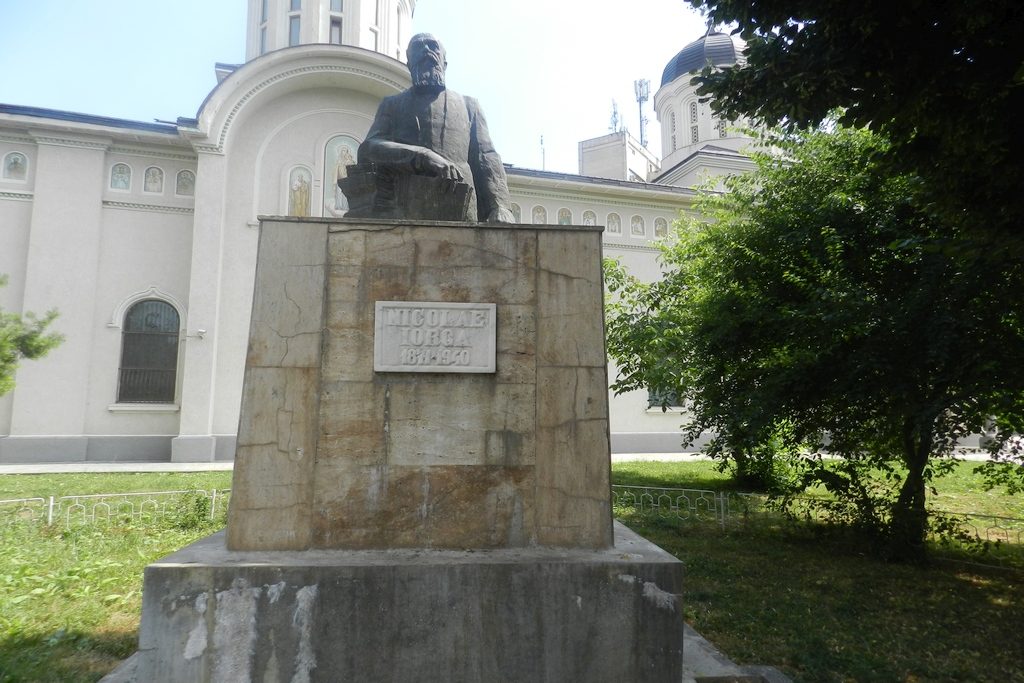

The statue was built up in the memory of Nicolae Iorga, important personality for the Romanians.
Nicolae Iorga (born Nicu N. Iorga, born on the 5th of June 1871, Botoșani – deceased on the 27th of November 1940, Strejnic, county of Prahova) was a historian, literary critic, curator, poet, encyclopedist, memoirist, minister, congressman, prime-minister, university professor and Romanian academician. It is known in the world as medievalist, Byzantinist, Romanist, Slavist, historian of the arts and philosopher of history. As George Călinescu stated, Iorga played a role in the Romanian culture, in the first decades of the XXth century, “the role of Voltaire”.
After the elementary and gymnasium studies in Botoșani, he attended the National High School from Iași in 1888. He graduated the University from Iași in only one year with the diploma “magna cum laude”, then he continued the university studies at Paris, Berlin and Leipzig, obtaining the doctor’s degree (1893) at only 23 years of age.
He was co-founder of the party the Nationalist – Democratic Party in 1910, member of the Parliament, and president of the Chamber of Deputies and of the Senate, minister and, for a short period of time, prime – minister. Wonder child, polymath and polyglot, with a prolific scientific activity, Iorga wrote 1003 volumes, 12755 articles and studies and 4963 reviews, this culminating with the History of Romania, in ten volumes. He taught at the University of Bucharest, at the one from Paris and at other academic education institutions and he founded the International Congress of Byzantine Studies and the Institute of South – West European Studies (ISSEE). He transformed the city Vălenii de Munte in an academic and cultural center.
In parallel with his scientific contributions, Nicolae Iorga was an activist of center – right, whose political orientations included elements of conservatism, nationalism and agrarianism.
Although in the last part of the high school he entered under the influence of Marxism, Nicolae Iorga surpassed this episode during the university, following to adhere for a short period of time at the conservatory literary group the Junimea literary circle. Nicolae Iorga founded conservatory magazines such as, Neamul Românesc, Drum Drept, Cuget Clar and Floarea Darurilor. He was an outstanding figure in the field pro-Antanta during the First World War, because of the support of the cause of the Romanians from Austro-Hungary and he had an important political role in Great Romania during the inter-war period. He initiated campaigns in order to defend the culture of Romania. He aroused controversies because of the anti-Semite rhetoric. He was the opponent of the National Liberal Party and of the National Romanian Party.
He opposed to the fascist group the Iron Guard and, after a period of calculation, he decided to support its rival, King Carol the IInd, entering after the dissolution of all the other parties into a unique party, of corporatist and authoritarian principle, the Front of the National Reborn. Because of the fact that he was involved into a personal dispute with the leader of the Guard, Corneliu Zelea Codreanu, therefore contributing without his willing to his killing, Iorga attracted the antipathy of the legionaries. He remained an independent voice of the opposition after the Guard instituted the National Legionary State, being ultimately assassinated by a legionary commando. After it was heard the new about the killing of Iorga, 47 universities and academies from all around the world carried the flag in at half mast.
